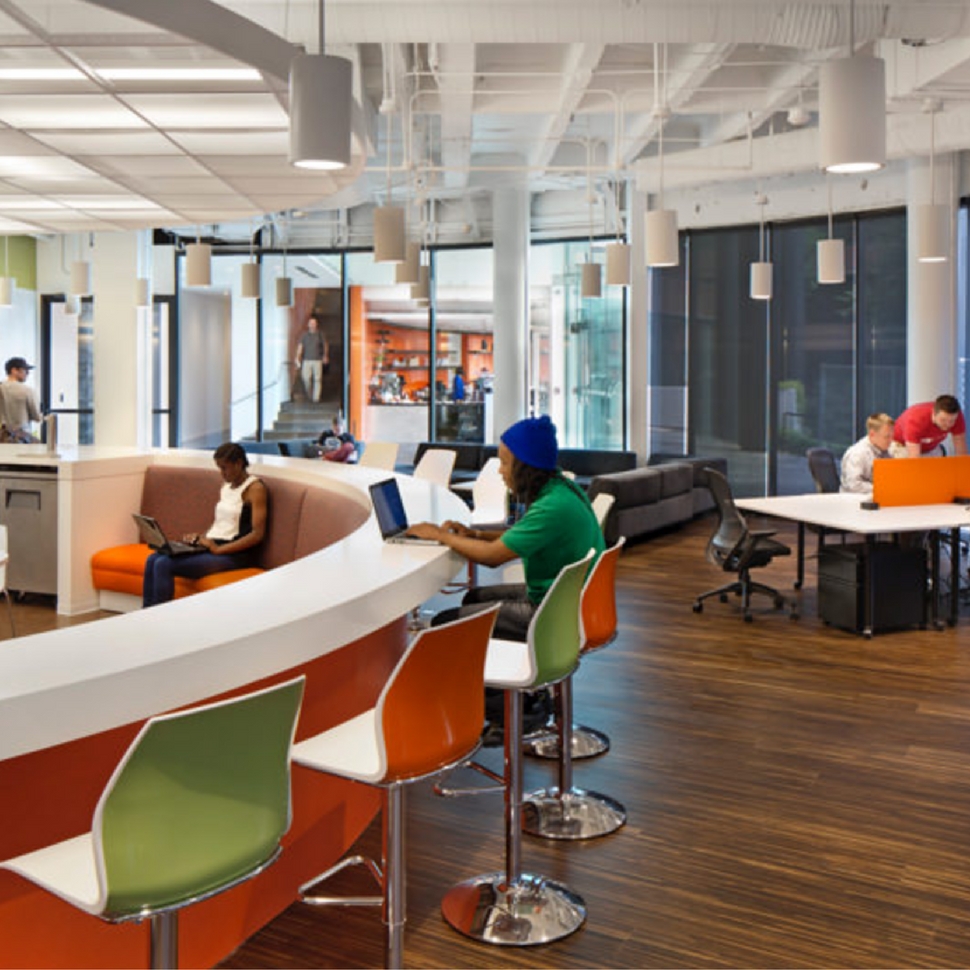The Atlanta Tech Village is a very different breed of tech startup hub as it nurtures a pay-it-forward culture and instills this value in everything it does. Its community and its core values really do shape everything is does, as opposed to chasing a bigger bottom line.
For example, the Village rejects startups that don’t fit with this mindset, no matter how amazing their technology may be. And it’s so focussed on raising the tech profile of Atlanta that it doesn’t want to set up in any other city.
With 100% occupancy, 1,100 members and roughly 300 companies over 103,000 sq. ft of coworking and office space, Atlanta Tech Village is the fourth largest tech hub in the US. It’s gained quite a reputation with its members, raising $400 million in investment in just over four years, and tech investor and actor Ashton Kutcher has even popped in to say hi.
Allwork caught up Karen Houghton, director of Atlanta Tech Village, to find out more about this innovative and unusual space.
What would I expect to see and who would I expect to meet if I walked through the doors at Atlanta Tech City?
We have four core values and one of them is “be nice”, so we’re super community driven. This value really shows our Southern roots as we’re located in Atlanta, which is a city of hospitality. So, we are a very community-driven and collaborative environment that wants to help entrepreneurs succeed.
We work to provide all the resources, from mentors to advisors to workshops and lunch and learns and VC connects to pretty much anything our entrepreneurs need to grow and scale and, hopefully, one day change the world.
How do you manage all those companies and keep a sense of community focus?
We have a really great team, there are 10 of us running an events team, a facilities team and a community team. I think our people really live out our core values of: be nice, dream big, work hard and play hard, and pay it forward. Because we live out those values, everything we do breathes in those values and helps keep that culture for the entire community.
For example, in the application process, you can have some really cool proprietary technology but you need to fit with our core values or you’re not going to be a member. We really do value that culture fit.
We also understand that startups are hard with 9/10 failing in the first year. We work to be in a place where there’s no shame tied to that. It’s more focused on working out what you learned from that experience and what the next idea will be. We recruit top talent because of that culture and the people we have here.
What sort of technology are people working on at Atlanta Tech Village?
Our community does not have any niche industries. So, we are completely open and our community works on B2C, B2B, mobile developments, internet security, the IoT and pretty much anything. We do tend to trend towards B2B software, there is very little hardware in our building.
Why do you think that is? Because it’s easier logistically to develop software in a startup hub than hardware?
Yes, plus our founder is David Cummings and he’s really passionate about B2B SaaS (Software as a Service), and most of the companies he invests in are housed in the Village. So, he has about 10 companies in the Village right now and they tend to be that B2B SaaS demographic. So, it just trends that way. People like to be with like-minded people.
It’s not an intentional focus.One of the exciting things about our space is that there’s a lot of diversity in the industries and in the products.
Is there anyone doing anything really unusual at Atlanta Tech Village?
There are tons of interesting things. One startup has developed a disposable iPhone charger that’s sold in bars and restaurants to people whose phone has died. You just buy the disposable charger for a few bucks, plug it in for a few minutes and your phone then has a full charge. That’s a really tangible benefit to everyday life.
Then, at the other end, we have a company called Storj that wants to be the AirBNB for cloud storage. It uses blockchain technology to essentially share your storage on your device with other people through the cloud. It’s a huge disruption for making cloud more affordable. Yes, you have Amazon and other big players in that space but they have a really big following. In fact, they closed a $30 million token sale in seven days. That shows you what they’re doing is very unique and potentially very disruptive.
That’s also a huge success. Can every startup at Atlanta Tech Village expect that sort of result?
In the four and half years we have been around, our startups have raised close to $400 million and we’ve created close to 3,200 jobs. There are a lot of successes including SalesLoft and Terminus and those are the sort of companies that now have 300 people working for them. They started with just one or two people.
We actually have a graduate program, which is not a cohort like a true accelerator would be but, once your team reaches a 50 to 60 person company, we throw you a really big party and then graduate you out.
We have seven graduates so far. One of them is Bitpay, which is the payment processing platform for Bitcoin. They raised more than $50 million in their first year and a half in the building and are still super successful.
Are there any specific challenges for the startups using your space to be a success and eventually graduate?
Specific to our Atlanta space, the startups face two key challenges. First, finding a really good technical cofounder can be difficult. There are a lot of talented folks here but finding the right match for you is always difficult. Second, finding funding at the seed stage and friends and family round are more challenging as well.
What are your next steps?
In Atlanta, we made a bit of a big splash because we were privately funded by David Cummings. So, when he had a large success with Pardot, which was acquired for $100 million, he did not take time off work. Instead, he used our building to give back to the wider Atlanta startup community.
This has triggered a really neat process for other entrepreneurs to have success and also give back to the startup community. We’re seeing more tech hubs and accelerators set up. There are really talented engineering students that are graduating from university, staying in Atlanta and building companies.
In our first year, we had people asking us: “Where’s your next one going to be? Are you going to open up in a new city?” But, for us, it’s a ‘one and done’ deal. Atlanta Tech Village was a $30 million investment and we’re quite successful, with a 100% occupancy and a waiting list of at least 10 companies.
In five years, we’d like to see Atlanta positioned as a top five tech hub in the United States and we’re going to see more large exits and successes from our homegrown startups.
It’s nice to see a space focusing on quality and quantity.
Absolutely. What we’re doing is not a real estate play. When you look at your demographic with startups and you know that a lot of them will fail, and that most of them do not have money.
For us, we’re for profit but it’s a double bottom-lined business where it’s community driven, and focused on paying it forward. Our main goal is, and always will be, helping entrepreneurs achieve their dreams.



 Dr. Gleb Tsipursky – The Office Whisperer
Dr. Gleb Tsipursky – The Office Whisperer Nirit Cohen – WorkFutures
Nirit Cohen – WorkFutures Angela Howard – Culture Expert
Angela Howard – Culture Expert Drew Jones – Design & Innovation
Drew Jones – Design & Innovation Jonathan Price – CRE & Flex Expert
Jonathan Price – CRE & Flex Expert













